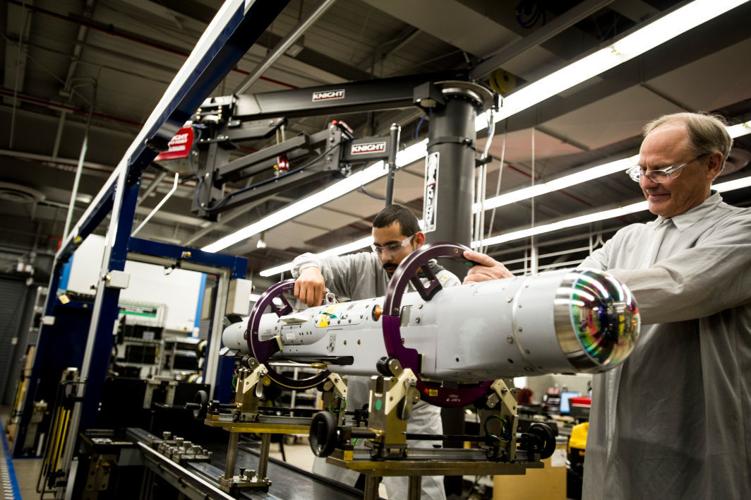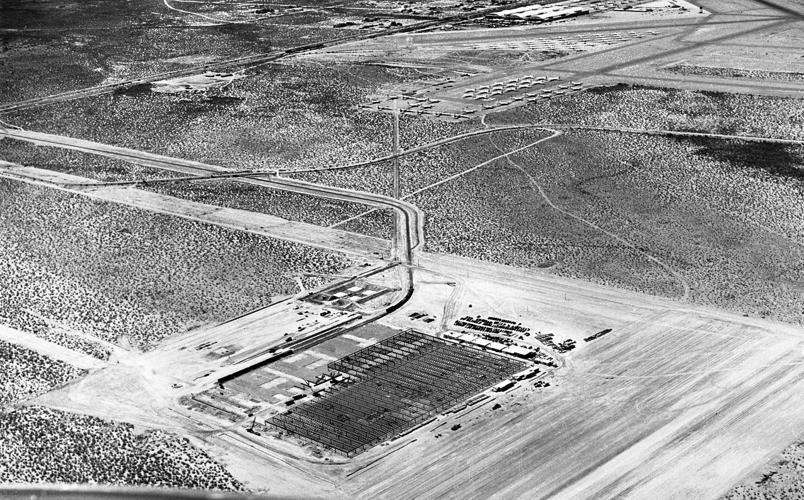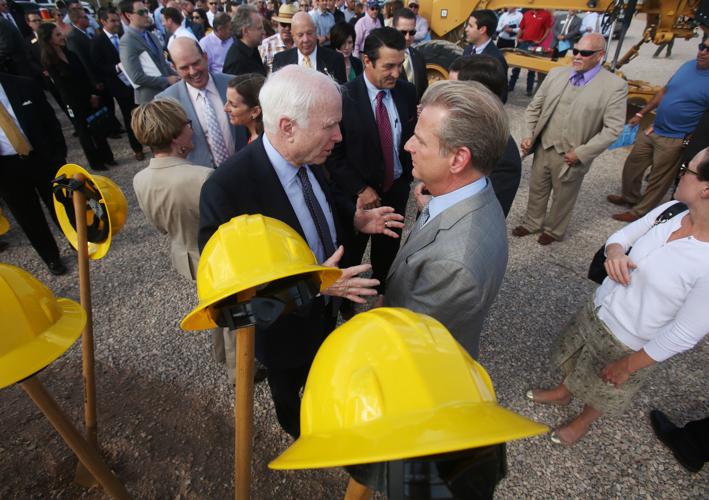Tucson-based Raytheon Missile Systems plans to expand its Southern Arizona operations and add nearly 2,000 high-paying jobs over five years, potentially adding billions of dollars to the local economy.
Raytheon announced the expansion plan Friday, after reaching tentative agreements with officials from the city, county and state on potentially tens of millions of dollars in tax breaks and related incentives.
In return, Tucson will get the kind of higher-paying, technology-based manufacturing jobs that have become the gold standard for economic development.
Raytheon said it plans to hire workers at all skill levels, with an emphasis on engineering and other higher-wage, technical positions. Junior engineers at the company make an annual salary of about $70,000 — nearly twice Tucson’s median household income in 2014.
“Those salary levels are going to permeate through this community, it’s going to drive up home sales, everything,” said Joe Snell, CEO of Sun Corridor Inc., the area’s main economic-development agency.
Missile Systems President Taylor Lawrence said the company’s expansion plans are driven by renewed growth in its 20 “franchise” missile programs due to U.S. and allied demand for its products. The company also is in contention for some major new programs, such as development of next-generation hypersonic missiles.
“We’re expecting a number of competitions to be decided this year,” Lawrence said in a conference call. “We’re kind of growing across the board.”
Raytheon’s existing product line includes the Tomahawk cruise missile, the AMRAAM and Sidewinder air-to-air missiles, and the Standard Missile series of ship-defense and ballistic-missile interceptors.
Buffer is key
to expansion
Lawrence credited local and state officials with helping Raytheon grow by establishing a buffer area around the company’s plant on the south side of Tucson International Airport and working to create a competitive incentive package.
“The strong support we receive from state and local organizations is essential to our expansion plans and will help provide Raytheon with the workforce and infrastructure to meet the growing demand we are seeing from our customers,” Lawrence said.
Besides the city, Raytheon said its partners in the expansion initiative include Gov. Doug Ducey, the Arizona Commerce Authority, Pima County, Sun Corridor Inc., Tucson Electric Power and the Tucson Airport Authority.
On a conference call with Ducey, Lawrence said details on the pace of hiring and the programs the company plans to grow or add will come later.
The Tucson City Council on Friday morning signed off on an agreement with Raytheon — already the area’s largest private employer with more than 10,000 local workers — that will allow the company to build on city-owned land near its airport operations. A City Council vote is expected Tuesday on an amended annexation agreement and potential tax incentives.
Government incentives
Also on Tuesday, the county Board of Supervisors will consider a number of its own incentives, including support for the company’s application for a foreign-trade-zone designation, which would reduce Raytheon’s property tax burden by about $16 million over the next 10 years.
The county incentive package also includes support for additional road infrastructure projects and restrictions on county-owned land adjacent to Raytheon.
The state has offered Raytheon $5 million through the Arizona Commerce Authority’s deal-closing fund, known as Arizona Competes, authority spokeswoman Susan Marie said.
Details of that deal are still under negotiation, Marie said, but she noted that funds are conditioned on applicants hitting hiring and wage goals, paid out incrementally as certain milestones are reached.
The expansion also will spread to smaller companies that supply Raytheon, officials said.
It is likely that Raytheon suppliers and subcontractors will also make announcements of plans to locate in the area in the near future, Pima County Administrator Chuck Huckelberry said.
Raytheon does business with about 500 companies across the state, about half in Southern Arizona, according to the Governor’s Office and Sun Corridor.
Job creation, facilities expansion and production are expected to result in billions of dollars of economic impact for Arizona over 10 years, the city said.
Though no formal economic impact study has been issued, the salaries alone for 2,000 Raytheon workers at an annual salary of $70,000 would add $1.4 billion to the area’s economy over a decade.
The additional property taxes that activity generates “will be dramatically more” than the taxes the county forgoes as a part of its proposed incentive deal, Huckelberry wrote in a memo to the board Friday.
Responding to Huntsville
Lawrence, of Raytheon, praised local officials for responding to company concerns after Raytheon passed over Tucson in 2010 and chose Huntsville, Alabama, as the site of a new missile plant.
That decision was made because of the lack of adequate buffer space around Raytheon’s airport plant and because Alabama offered a generous incentive package, Lawrence said.
After the city, county and airport worked to relocate a road south of Raytheon and swapped land to create an aerospace business park nearby, the buffer issue has been “completely resolved,” Lawrence said.
Ducey called the Raytheon expansion a big win for the state and the latest example of a rebounding Southern Arizona economy, citing hundreds of new Tucson-area jobs announced in the past year by Comcast, Caterpillar, HomeGoods and human-resources systems provider ADP.
“This is great news and just more proof that Southern Arizona’s economy is on fire,” Ducey said. “This demonstrates that Tucson is attractive and competitive and can win at the economic-development game.”
“Working over
the weekend”
Tucson Mayor Jonathan Rothschild said some aspects of the city’s deal are still being negotiated with the defense contractor. However, a final council vote is scheduled Tuesday night.
“What we are hoping to do on Tuesday is bring to council an agreement with Raytheon that would enable Raytheon to bring an additional 1,900 jobs, at least, to Tucson,” Rothschild said.
As a result of the deal, the company could spend upwards of $400 million in new construction on city-owned land near Tucson International Airport, Rothschild said.
“It is a complicated deal so we will be working over the weekend to finalize the tight language,” he said.
The mayor says he hopes Raytheon will build as soon as possible and expects Raytheon to break ground next year.
The amended agreement will extend the time frame of the current annexation agreement and tie tax incentives to Raytheon’s completion of the expansion project and creation of the new jobs, said Mike Rankin, the city attorney.
Besides the funding offered through the state’s deal-closing fund, Raytheon also apparently qualifies for a refundable state income tax credit available to companies making capital investments to build or expand certain facilities, the Arizona Commerce Authority’s Marie said, but the company has not yet applied for that program.
FOREIGN-trade zone
Pending approval by the Board of Supervisors Tuesday, Pima County will also be offering incentives, including support for Raytheon’s foreign-trade-zone application, which would come with significant property tax savings.
The company currently pays property tax based on an 18 percent assessment ratio, which would fall to 5 percent if its foreign-trade-zone application is approved by the U.S. Department of Commerce.
The reduction would apply to both existing and planned facilities and would result in roughly $16 million in reduced tax receipts over the next 10 years, according to a memo Huckelberry wrote to the board on Friday.
For the current tax year, calculated with the unaltered assessment ratio, the company is expected to pay nearly $3 million in property taxes, according to an estimate provided by the treasurer’s office.
Raytheon has consistently ranked among the top 10 property taxpayers in Pima County, according to the most recent comprehensive financial report.
The property tax drop would affect only the taxes controlled by the county. The company has major manufacturing operations at its headquarters site next to the airport and at the University of Arizona Tech Park on South Rita Road, along with several other smaller local sites.
Other taxing districts, including the Sunnyside Unified School District and Pima Community College District, will receive “the full value of property taxes as paid at the higher assessment ratio,” according to the memo.
More land moves
The county plan also calls for restrictions on the use on 382 acres of property it owns near Raytheon, including limits on building heights and other design features, as well as prohibitions on foreign ownership by companies based in non-NATO countries. That land was purchased in 2012 for around $6 million to provide a buffer for the company.
Huckleberry recommends selling 48 acres of that land adjacent to Raytheon to the Air Force at market value. That land would be used to develop a state-of-the-art secure “entry-control facility.”
The county would also commit itself to continued road infrastructure improvements near the facilities.
Most recently, the Pima Association of Governments awarded the county $10 million in late October for a widening of Aerospace Parkway and other changes near Raytheon.
On Friday, Huckelberry told the Star that another roadway priority will be the so-called Sonoran Corridor, which would connect Interstates 10 and 19 and pass near Raytheon. The estimated price tag is between $600 and $700 million, he added.
County voters shot down $30 million of support for the project in a bond election last November, though Huckelberry said the project has been designated a “priority” by the federal government, “which means we should receive substantial federal participation.”
Since 2012, roughly $33.4 million has been spent on county-led projects that “set the stage” for the expansion, according to a summary in the memo.
Supervisor Sharon Bronson said the incentive package has her vote, and she hopes it has at least another three supervisors behind it.
Supervisor Ramon Valadez, who hosts Raytheon’s airport plant in his district, said he enthusiastically supports the incentive plans and predicted quick approval.
“I’ve had the pleasure of representing that area for the last 20 years now, and I’ve always supported the largest private employer in our region,” he said.
Supervisor Ally Miller, who has been critical of some county economic development efforts, was the lone vote against rerouting the Hughes Access Road in 2015, a measure county officials said was necessary to actualize the benefits of the buffer.
Miller did not immediately return calls for comment.
Some concerns about skilled workers
Asked during a conference call if Raytheon expects to have any trouble finding the skilled workers it needs to fill the new posistions, Raytheon’s Lawrence said he remains concerned about the level of science, technology, engineering and math education in Arizona.
“We’re always concerned about getting the right type of talent,” he said, though he added that he was very impressed with Raytheon’s latest crop of interns.
Raytheon will continue to rely on the University of Arizona for engineering grads and other talent the company needs, Lawrence said.
“We’re concerned but not alarmed,” said Lawrence, who has frequently written op-ed pieces advocating for more state support of K-12 schools and universities.
Sun Corridor’s Snell said Raytheon’s expansion adds urgency to the quest to develop a more-skilled workforce.
“So far, we have found we can fill those jobs, but if we look into the future, we’re going to have to import more skilled workers or grow our own,” Snell said.






